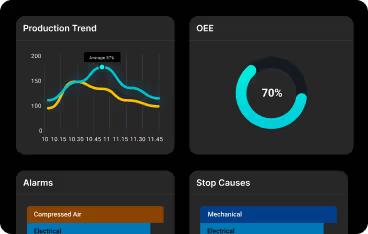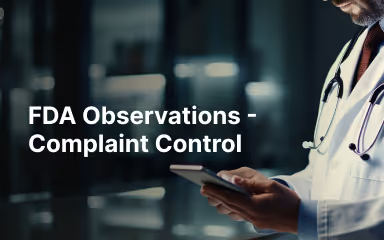Market Complaints Guidelines
Market complaints management is a critical aspect of pharmaceutical manufacturing, playing a vital role in ensuring customer satisfaction, product quality, and regulatory compliance. Effectively managing market complaints helps pharmaceutical companies address issues promptly, improve products, and maintain trust with customers and regulatory authorities. This blog will explore the key guidelines governing market complaints management in the pharmaceutical industry and highlight their significance.
Key Market Complaints Management Guidelines in the Pharmaceutical Industry
1. FDA 21 CFR Part 820.198
The U.S. Food and Drug Administration (FDA) regulations, specifically 21 CFR Part 820.198, outline the requirements for complaint handling in the manufacture of medical devices. While this regulation is specific to medical devices, many principles are applicable to pharmaceuticals. Key aspects include:
- Complaint Evaluation: Evaluating each complaint to determine whether it constitutes an adverse event.
- Investigation: Conducting thorough investigations of complaints to determine their root cause.
- Documentation: Maintaining detailed records of complaints and investigations.
Useful links: FDA 21 CFR Part 820.198
2. EU Medical Device Regulation (MDR) 2017/745
The European Union's Medical Device Regulation (MDR) 2017/745 provides requirements for complaint handling for medical devices marketed in the EU. Similar to FDA regulations, it emphasizes:
- Complaint Recording: Recording and documenting all complaints received.
- Investigation and Evaluation: Investigating complaints to determine their validity and root cause.
- Corrective and Preventive Actions (CAPA): Implementing CAPA as necessary to address complaints and prevent recurrence.
Useful links: EU MDR 2017/745

3. ISO 13485:2016
ISO 13485:2016 specifies requirements for a quality management system for medical devices, including complaint handling. Key aspects include:
- Complaint Processing: Establishing procedures for receiving, reviewing, and evaluating complaints.
- Investigation: Investigating complaints thoroughly to identify root causes and take appropriate corrective actions.
- Reporting: Reporting serious incidents to regulatory authorities as required by applicable regulations.
Useful links: ISO 13485:2016
4. ICH Q10: Pharmaceutical Quality System
While not specific to market complaints management, the International Council for Harmonisation (ICH) Q10 guideline provides a comprehensive model for a pharmaceutical quality system, which includes elements relevant to complaint handling. Key aspects include:
- Quality Management System: Establishing and maintaining a quality management system to manage all aspects of product quality.
- CAPA: Implementing CAPA based on complaints to address identified issues and prevent recurrence.
Useful links :
ICH Q10 Pharmaceutical Quality System
European Medicines Agency: ICH Q10
5. WHO Guidelines on Safety Monitoring of Herbal Medicines in Pharmacovigilance Systems
For herbal medicines, the World Health Organization (WHO) provides guidelines on safety monitoring and pharmacovigilance. These guidelines include requirements for handling market complaints related to herbal products, emphasizing:
- Complaint Reporting: Reporting complaints related to herbal medicines to appropriate regulatory authorities.
- Investigation and Analysis: Investigating complaints to identify potential safety issues or product quality concerns.
The Importance of Adhering to Market Complaints Management Guidelines
Adhering to market complaints management guidelines is essential for several reasons:
- Customer Satisfaction: Promptly addressing complaints helps maintain customer trust and satisfaction.
- Product Quality: Thorough investigation and resolution of complaints contribute to product quality improvement.
- Regulatory Compliance: Compliance with regulations ensures that companies meet legal requirements and avoid penalties.
- Risk Management: Identifying and addressing issues through complaints management helps mitigate risks to patients and consumers.
- Continuous Improvement: Feedback from complaints can be used to drive continuous improvement in products and processes.
Best Practices for Effective Market Complaints Management
To implement an effective market complaints management process, pharmaceutical companies should consider the following best practices:
- Establish Clear Procedures: Develop and document clear procedures for receiving, documenting, investigating, and resolving complaints.
- Train Personnel: Ensure that personnel involved in complaints handling are adequately trained in relevant procedures and regulations.
- Prompt Response: Respond promptly to all complaints to acknowledge receipt and initiate investigation.
- Thorough Investigation: Conduct thorough investigations of complaints to identify root causes and determine appropriate corrective actions.
- CAPA Implementation: Implement corrective and preventive actions based on the findings of complaint investigations.
- Communication: Maintain open communication channels with customers and regulatory authorities throughout the complaints handling process.
- Documentation: Keep detailed records of all complaints received, investigations conducted, and actions taken.

Recent Changes in Market Complaints Management Guidelines
Staying updated with recent changes in market complaints management guidelines is crucial for maintaining compliance and ensuring best practices. Here are some recent updates:
- FDA's Final Rule on Post market Surveillance: The FDA has issued a final rule on post market surveillance, which includes requirements for monitoring and reporting of complaints for medical devices.
- EU MDR Implementation: The European Union's Medical Device Regulation (MDR) has introduced new requirements for complaint handling, including stricter reporting obligations and enhanced oversight.
- ISO 13485:2016 Revision: ISO 13485:2016, the standard for medical device quality management systems, has been revised to include updated requirements for complaint handling and adverse event reporting.
Conclusion
Market complaints management is a critical aspect of pharmaceutical manufacturing, ensuring that customer feedback is promptly addressed, and product quality is maintained. By adhering to established guidelines such as FDA regulations, EU MDR, ISO 13485:2016, ICH Q10, and WHO guidelines, pharmaceutical companies can effectively manage market complaints, maintain regulatory compliance, and enhance customer satisfaction. Implementing robust market complaints management processes and best practices is essential for achieving success in this highly regulated industry.
Observations in 2025

.png)
.png)

.png)























